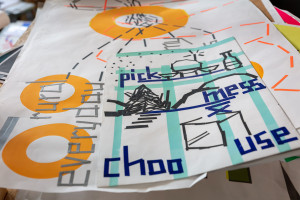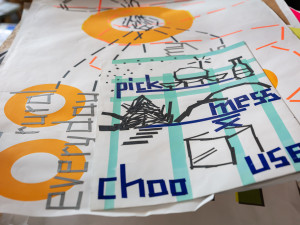Video
Meronomy: approaching the archive with curiosity
Online dicussion
Wednesday 30 June 2021

Meronomy: approaching the archive with curiosity was a public conversation held in collaboration with Art360Foundation around modes of archiving, in the context of Compost. Kathrin Böhm: Turning the Heap at The Showroom.
With contributions from Chantelle Lue and ߔߎ߯ߟߍ߫ ߞߊ-ߖߊ߬ߣߏ߬ߟߌ߲߯ߗߌ (Pule kaJanolintji), UBUNGXENYE (Parthood); Hayley Newman and Bryan Reedy (HAND); and archivist and curator Laura Callegaro, introduced and chaired by Ellie Porter, Head of Programme, Art360 Foundation. Joining from the exhibition space at The Showroom were artist Kathrin Böhm and Lily Hall, curator at The Showroom.
Khuluma ngokuzithoba nesizotha eikhule•, unpacking, parthoods, misleading, not presenting, sieving through, practicing, acquiring, not knowing, travelling, organising, loosing, bringing out, pulling out, refusing, in touch, tuning, foregrounding, not defining. Keep it complex, make it clear.••
• & •• These first and final sentences are suggestions given by colleagues, which might become proverbs.
Schedule
5pm - Introduction by Ellie Porter, Head of Programmes Art360 Foundation
5.05-5.30pm Chantelle Lue and ߔߎ߯ߟߍ߫ ߞߊ-ߖߊ߬ߣߏ߬ߟߌ߲߯ߗߌ (Pule kaJanolintji), UBUNGXENYE (Parthood)
5.30-5.45pm Hayley Newman and Bryan Reedy (HAND)
5.45-6pm Laura Callegaro, Curator and Archivist
6-6.20pm Q&A, chaired by Ellie Porter, with artist Kathrin Böhm and Lily Hall, curator at The Showroom
Biographies
Chantelle Lue is a strategist and creative producer from Manzini, eSwatini and based in London. Her core practice stems from an interdisciplinary background in architecture and communications. Interested in the notion of data healing, her current research is concerned with technologies that are re/defining knowledge acquisition and driving cultural production across Africa and its diaspora.
ߔߎ߯ߟߍ߫ ߞߊ-ߖߊ߬ߣߏ߬ߟߌ߲߯ߗߌ (Pule kaJanolintji), ngumcwaningi wolimi lwesiNtu nezabathwa, isazi somlando nemikhuba yokusetshenziswa kwezinkulumo zaseNingizimu, futhi umthuthukisi wezinhlelo zokuloba zezwekazi, njengesiBheqe Sohlamvu. Pule is a scholar of linguistics and a cultural historian of speech practices of Azania/!Naremâb, promoting writing systems of the continent, like N’Ko or Ditema tsa Dinoko script. His MA research describes South African cryptolects - secret forms of speech.
UBUNGXENYE (Parthood)
This is a practice to reorganise the archive. Principles of meronomy as a cognitive semantic map could change the way it is imagined. We want to explore ways of going about this as an alternative typological system for organising knowledge.
This could be seen as an experiment to test how one would illustrate a meronomic typology (as opposed to a taxonomic typology), of the diversity of language in Azania, and whether that might result in a different experience of the construction and use of archive. This might result in a rhizomatic form, say, that may effect novel epistemological pathways, developing a more intuitive or imaginative language knowledge archive, perhaps.
Through mapping this data, we will begin to re.member, and better understand how different ways of knowing translate into language tools for self-expression.
Hayley Newman is an artist, writer and performer with a passion for humor, subjectivity, documentary practices and fiction. She creates performances, interventions, music and texts and has made work individually and collaboratively in nightclubs, shops, on trains and marches as well as for the concert hall or gallery. In 2016/7 she was a recipient of an Art360 award for artists and has been working to organise her physical archives and digitise key works, with a view to preserve tapes and capture information from formats that may soon be no longer accessible. She is Associate Professor of Fine Art at the Slade School of Fine Art, UCL, where she tutors on the doctoral programme. She lives and works in London and is represented by Matt’s Gallery.
Bryan Reedy is an artist based in London producing paintings, sculptural works, and digital ephemera rooted in a concern for our greater psycho-corporeal existence. Rendered in bold, abstract forms, Bryan’s work is informed by the transitory landscapes of dreams and draws on his personal engagement with the expression of identity (socio-political, sexual, philosophical) and the making of place. The product of a peripatetic childhood, Bryan has often wandered between callings and is a violin bow maker trained in the French tradition, has built houses, planted gardens, worked as bookbinder for many years and as a freelance graphic designer has always prioritized projects that serve to broaden the voice of the fringe.
HAND encompasses ongoing research towards the creation of collaborative, open source archiving software for artists that aims to provide a digital archiving environment that does not privilege the art object and financial provenance over more ephemeral works and the social context that surrounds creative production. HAND is being developed by Bryan Reedy and Hayley Newman through discussions with artists, archivists, librarians, conservationists and the cultural sector.
Laura Callegaro (Venice, IT) is a curator and archivist who works and lives in London. Her research investigates the use and contextualisation of language, its aesthetic, performative aspects, and its potential forms of resistance in nowadays neoliberal scenarios. In 2018 she co-founded the curatorial collective trans-, that establishes a framework for critical thinking, research, and exhibition-making by working with artists whose practice questions the impact of globalisation and semio-capitalism on the social body in different scenarios.
